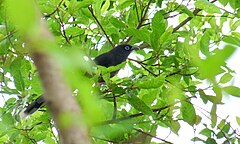Blue-faced malkoha: Difference between revisions
m r2.7.2) (Robot: Adding eu:Phaenicophaeus viridirostris |
m r2.7.1) (Robot: Adding nl:Kleine groensnavelmalkoha |
||
| Line 43: | Line 43: | ||
[[it:Phaenicophaeus viridirostris]] |
[[it:Phaenicophaeus viridirostris]] |
||
[[hu:Kékarcú selymeskakukk]] |
[[hu:Kékarcú selymeskakukk]] |
||
[[nl:Kleine groensnavelmalkoha]] |
|||
[[sv:Dvärgmalkoha]] |
[[sv:Dvärgmalkoha]] |
||
[[ta:நீல முகப் பூங்குயில்]] |
[[ta:நீல முகப் பூங்குயில்]] |
||
Revision as of 11:58, 26 August 2012
| Blue-faced Malkoha | |
|---|---|

| |
| Scientific classification | |
| Kingdom: | |
| Phylum: | |
| Class: | |
| Order: | |
| Family: | |
| Genus: | |
| Species: | P. viridirostris
|
| Binomial name | |
| Phaenicophaeus viridirostris (Jerdon, 1840)
| |
The Blue-faced Malkoha, Phaenicophaeus viridirostris , is a member of the cuckoo order of birds, the Cuculiformes, which also includes the roadrunners, the anis, and the Hoatzin.
It is restricted to Sri Lanka and southern India. The Blue-faced Malkoha is a bird of open forests and scrub jungle. It nests in a thorn bush, the typical clutch being two, sometimes three, eggs.
This is a largish species at 39 cm. Its back and head are dark green, and the uppertail is green edged with white. The throat and belly are lighter green. There is a large blue patch around the eye and the bill is green. Sexes are similar, but juveniles are duller and barred above.
The Blue-faced Malkoha takes a variety of insects, caterpillars and small vertebrates. It occasionally eats berries.
References
- Template:IUCN2006 Database entry includes justification for why this species is of least concern
- Birds of India by Grimmett, Inskipp and Inskipp, ISBN 0-691-04910-6

